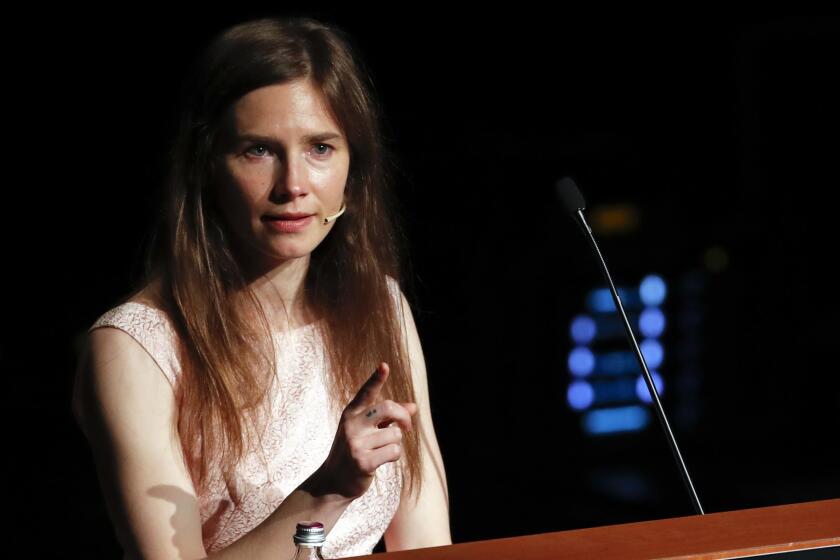The Worst of All Possible Worlds : JERNIGAN, <i> By David Gates (Alfred A. Knopf</i> :<i> $21</i> ;<i> 238 pp.)</i>
- Share via
To know Jernigan is to discover an unlikely sympathy for Job’s friends, the ones who tried to console him in his misfortunes by telling him that they were probably his fault.
Certainly the protagonist and narrator of David Gates’ novel has plenty to complain of. After 10 years, he is fired from his job and allowed a month’s salary, six weeks of medical benefits and one week’s use of the office telephone to look for another job. His wife, depressed by his coldness, strips at their Fourth of July barbecue, runs naked to the car, backs full-tilt into the street and is killed when a van smashes into her. His father, a talented but unlucky artist, burns to death in his studio after an alcoholic binge. Jernigan himself is an alcoholic; when he was younger, he tripped regularly on LSD.
Gates’ purpose is not to detail the misfortunes themselves--they do seem excessively front-loaded--but to write of how his protagonist takes them. Badly, is the answer. Not only would Jernigan prefer to curse the darkness than light a candle, but when anyone else ventures to light one, he blows it right out.
His voice is sardonic, angry, self-absorbed, self-pitying and frequently drowned in gin. As a character, he tries the reader’s sympathy; as a narrator, he places that trial right in the center of things, so that it is hard for much else to get through.
Some things do, though, and that is a tribute to Gates’ considerable talent. It is not easy, but perhaps it stands at a middling level of difficulty for an author to let a reader get through the words of a brutish or deformed narrator to an insight beyond that narrator’s vision. It is harder to do this when the narrator is savvy, self-aware and even, in his chilling misery, occasionally sympathetic.
Jernigan’s story is a vortex, and his sensibility coarsens and spirals down as he tells it. Even as it does, it manages to impart a kind of reverse upward spiral to the two people who are closest to him and who try, in their own two ways, to help him. As he sinks, they painfully rise. One of them is Martha, the woman he lives with; the other is his teen-age son Danny.
Following a brief preliminary section which is, in fact, the end--Jernigan flees to a cabin in the winter woods, and goes from there, angrily defiant, to a drying-out clinic--the story starts a year or so after his wife’s death. Still in shock, Jernigan stays on in their New Jersey suburban house, numbly commuting to his real-estate job in New York and gingerly trying to bring up Danny.
His numbness is penetrated by Martha, a neighbor separated from her husband and the mother of Danny’s girlfriend Clarissa. In her late 30s, a bit overweight and carelessly attractive, Martha is a Whole Earth Catalogue exile from the ‘70s. She grows her own vegetables and raises rabbits in her basement--shooting them with a .22 pistol when she wants to eat one--and gets homemade moonshine from another friend who lives not far away.
She is warm, awkward and direct. She nerves herself up to invite Jernigan to a party and gets tipsy before she can muster the courage to show that she wants him. Wary at first, he is strongly attracted; before long, he has moved in. Danny sleeps with Clarissa upstairs while their parents sleep together below.
It is a messy arrangement, as Jernigan complains and Martha calmly admits. Bitter complaint and calm acceptance is the back-and-forth matrix of their relationship. Frozen for so long, Jernigan cannot resist Martha’s warmth. He needs it, but he is allergic to it as well. He frets more and more angrily--about Danny and Clarissa, about the loss of his job, about his feelings of aimlessness. Martha points out that he has a chance to do something he really likes--write, for example--that he can sell his house, which he no longer needs, and use the money for freedom. This is hope, but to Jernigan, hope is a threat.
If Martha lives by making the best of things--though without illusions--it is not because things have been easy for her. Clarissa is on hard drugs; her husband is brutal, half-mad and still a threat; she has no discernible means or future. But her approach to disaster is to wrest as much life as she can out of it. Jernigan’s approach is to rail, despair and turn abusive. And the book tells of his helplessly deepening anger, and his growing harshness and isolation. As he blurs and declines, Martha--touching but never pathetic, funny but never cute--grows more distinct. And Danny, a sulky and evasive adolescent at the start, awakens into an effort to pull his father back into life.
Gates’ writing is always intelligent and sometimes powerful. There are particular gems: theinitially friendly and increasingly hateful interview in which Jernigan’s boss fires him; the oddly mortal struggle to warm up the winter cabin where he takes refuge; a bleakly comical portrait of a depressed man Christmas-shopping. The depictions of Martha and Danny are subtle and moving, the more so since we perceive them through the darkness of Jernigan’s narrative.
It is Jernigan who is the problem, and for the reader, as well. I am not certain what Gates is trying to tell us. Perhaps he intends his protagonist to exemplify what can happen to a self-indulgent ‘70s generation conditioned to believe that life owes it everything, and that freezes into angry despair when payment is made, instead, in the currency of pain and tracklessness.
The trouble is that despite his wit, his unblinking perceptiveness and sporadic moments of touching effort, Jernigan is not really very interesting. And so there is no sense of loss, no countervailing tragic lift as his self-punishing insistence on defeat pulls him down, and pulls the book down with him.
More to Read
Sign up for our Book Club newsletter
Get the latest news, events and more from the Los Angeles Times Book Club, and help us get L.A. reading and talking.
You may occasionally receive promotional content from the Los Angeles Times.










